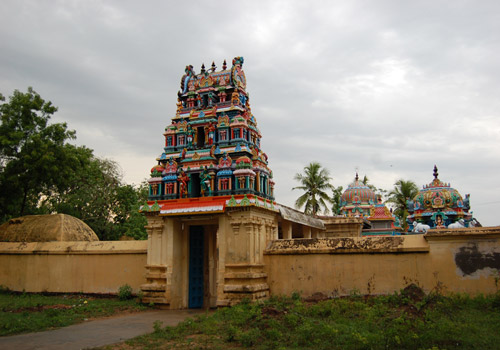Saint Tirugnana Sambandar had sung the glory of Lord of the
temple in his Thevaram hymns. This is the 64th Lord Shiva temple on the
southern bank of Cauvery praised in Thevaram hymns.
The temple had worshipful devotees as Lord Brahmma, Mother
Umadevi and Lord Muruga. The small Rajagopuram is facing
east. The temple also has a flag post-Kodimaram, Nandhi and the Balipeeta. Lord
Vinayaka, celebrated four saivite saints, Chola king and his queen are in the
prakara. On the outer prakara also there are shrines for Vinayaka,
Lord Muruga, Mother Gajalakshmi and Navagrahas the nine planets. There
is an ancient idol of Lord Muruga in Shiva shrine.
Though a Shiva Temple, Lord Muruga occupies all
dominance in the temple. He is before the sanctum sanctorum as Lord
Dandayuthapani showing a Chinmudra, eyes closed in meditation. His
ears are long. From the vimana-tower above sanctum sanctorum -
Arthanareeswara Dakshinamurthi and Veena Dakshinamurti grace the devotees.
There are two Vinayakas at the entrance of the temple ? Guha
Vinayaka and Sakshi Vinayaka. It is said that they came as escorts
to Lord Muruga when He came here for penance and chose to stay here itself
then.
Lord Brahmma, Creator of the world could not answer a
question posed by Lord Muruga ? the meaning of Ohm Pranava Mantra. Mocking at Him, Muruga also put him in
jail. Lord Shiva condemned Murugas
action. This resulted in the stoppage of
creation. Lord Muruga simply said that Brahmma could start His work after
learning the meaning of the OHM Pranava Mantra. Lord Shiva demanded Muruga to explain the meaning to Him. Lord Muruga did it perfectly as a Guru and
Shiva was an obedient student then. This
event took place at Swamimalai.
This supremacy promotion made Lord Muruga proud. To punish Him Lord Shiva made Him dumb. Lord Muruga came to Tirupandhurai, made a
Shivalinga and worshipped to regain His skills. Pleased Shiva granted the speaking skill to His divine Son. Hence, Lord is praised as Pranaveswarar ?
Lord of Pranava Mantra.
Moolavar: Sivanandeswarar, Pranaveswarar
Urchavar: Peranaweswarar
Amman / Thayar: Mangalambikai,
Malaiyarasi Ammai
Thala Virutcham: Vanni
Theertham: Mangala
Theertham
Pathigam: Sambandar
Old year: 1000-2000
years old
Historical Name: Thirupenuperundurai
This sivasthalam temple is located at a distance of about 10
Kms from Kumbakonam on the banks of river Arisalaaru. Take the Kumbakonam -
Natchiarkovil - Poonthottam road. TiruppenuPerunthurai (now konwn asTiruppandurai) is located at a distance of about 2 Kms. after crossing
Natchiarkovil.
Lord of the temple is a swayambumurthy.
The temple celebrates
Lord Muruga related festivals as Thai Poosam in (Jauary-February)
Vaikasi
Visakam in (May-June)
Aipasi Skanda Sashti in (October-November)
Tirukarthikai
in (November-December).
Those unable to speak, suffering from stammering bathe in
the Mangala Theertham and perform abishek to Lord Muruga with honey for 48 daysto gain speech skills.
Devotees do the usual abishek and aaradhanas to Lord and
Mother and offer vastras.
The temple is open from 8.00 a.m. to 12.00 a.m. and 5.00
p.m. to 7.00 p.m.
Sri Sivanandeswaar Temple, Tirupandurai, Nachiarkoil post,
Kumbakonam Taluk, Thanjavur district-612 602. Contact Number - +91 4352448138,
94436 50826.
Do:
- Do pray your Ishta Devata before pilgrimage to Temple.
- Do contact Temple Devasthanam information centre for enquiry, temple information and for Pooja details etc.
- Do reserve your travel and accommodation at Temple well in advance.
- Do bath and wear clean clothes before you enter the temple.
- Do concentrate on God and Goddess inside the temple.
- Do maintain silence and recite Om Namahsivaya or your Istamantram to yourself inside the temple.
- Do observe ancient custom and traditions while in Temple.
- Do respect religious sentiments at Temple.
- Do deposit your offerings in the hundi only.
Don't s:
- Do not come to Temple for any purpose other than worshipping of God and Goddess.
- Do not smoke at Temple.
- Do not consume alcoholic drinks at Temple.
- Do not eat non-vegetarian food in the Kshetram.
- Do not approach mediators for quick Darshanam. It may cause inconvenient to others.
- Do not carry any weapon inside the temple.
- Do not wear any head guards like helmets, caps, turbans and hats inside the temple premises.
- Do not perform Sastanga Pranama inside the Sanctum Sanctorum.
- Do not take much time while performing Sparsa Darshanam to God in Garbhagriha.
- Do not buy spurious prasadams from street vendors.
- Do not encourage beggars at Temple.
- Do not spit or create nuisance in the premises of the temple.
